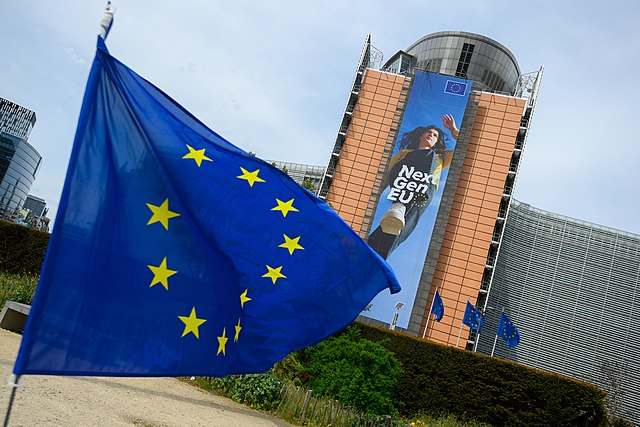Photo: European Commission Berlaymont building, Brussels – Wikimedia Commons
On the 5th of October the third summit of the European Political Community took place in Granada, Spain. The EPC is an initiative, mainly from French president Macron, to promote stability, prosperity and security on the continent and offer countries dialogue in a non-EU framework. However, EU-accession has been a main topic at the conferences. President of the European Council Charles Michel has repeated several times that 2030 is the year when the nine candidate-membership countries and the EU have to be ready for enlargement. Questions arise what a significant increase in the current Union set-up would do to the bloc. What will be the impact on the EU budget, is the veto-right realistic in a Union of plus-30 countries, what about the common agricultural policy if powerhouses like Ukraine join? These candidate states have to be ready in 2030 – but the EU has to be up to speed as well and experts, consulting in working groups, list many detailed reforms that would be needed. We provide you with the most eye-catching ones.
Priority jump
Since the Russian invasion of Ukraine, EU enlargement has made a jump on the priority list – partly explaining Charles Michel’s words in Granada. Before the invasion, there was little attention and enthusiasm for expansion of the EU. It has been ten years since Croatia joined the EU, and now there are a number of countries at the doorstep, realising the importance of joining a stable bloc in a fast-changing world. EU’s concerns about Russian and Chinese influence on the Balkans and Europe’s east are not new. However, a new impulse is given to EU-enlargement to cope with these growing forces and pursue the Union’s geopolitical prevalence in the region.
Institutional reforms
Decision-making
With 27 countries, the veto right has already proved to be a source of annoyance, putting a lot of power in the hands of countries potentially abusing the right. If the bloc grows in size, it will be harder to achieve unanimity, slowing down EU-procedures. A change to a qualified majority voting (QMV) in order to accept proposals would be a reasonable adjustment. The veto right makes domestic politics a strong factor, as single countries can block a proposal on its own. Changing the voting-process already, will make the enlargement process run more smoothly. The EU has to think critically about at which policy areas QMV would be possible and desirable. Setting aside veto powers does require a treaty change, a target that has proved to be difficult to achieve looking at the turmoil caused by the referendum in 2005 about a possible EU-constitution.
Size of European Parliament
The current European Parliament consists of 705 seats. With new countries joining, the Union could potentially grow with tens of millions of people, on top of the current 448 million. The seat allocation will be shifted because of changing ratios of population share and the number of awarded seats. Countries who will be reduced on the number of seats will be less represented if no seats are added. Currently there is a limit of 751 seats. This limit could be expanded, but raises the question if the parliament would get too big to function in a controllable way.
Agricultural policy
Institutional reforms are needed if we want to include accession candidates like Ukraine into the Common Agricultural Policy (CAP). The size of Ukraine’s agricultural sector would distort the internal market completely if no changes are made. The CAP supports farmers with income support and funds market measures. This costs the EU around €55 billion a year, more than a third of its total budget. Keep supporting the sector in the proportions the EU has done will be untenable. Current rules applied to an enlarged EU would owe Ukraine €96,5 billion from the CAP over seven years, making it the largest recipient in an instant. Calculations suggest farm subsidies of existing members would decrease by 20% as a result of that. A preview of the potential effect of Ukraine’s accession on the European agricultural market can be seen now Ukraine is exporting grain to neighbouring countries while the Black Sea Grain Initiative is inactive. Countries are overloaded with Ukrainian produce, forcing domestic farmers to lower their prices, putting their companies at risk. This has put a big strain on Ukraine’s relations with various Visegrád-countries.
Budgetary reforms
The issues surrounding the CAP show that reform of the EU budget is inevitable. The budget will probably increase to €256 billion, compared to €186 billion last year. “All member states will have to pay more to and receive less from the EU budget,” the EU council states. Many countries will be turned from net beneficiaries to net contributors, shifting the financial balance. Those who are now eligible for funds that provide money to less developed countries, will seize to receive these and could become net contributors. This could put new pressure in contexts where the EU is already unpopular. Budgetary negotiations could be simplified by cooperating in smaller groups of member states to agree on policies. So called ‘coalitions of the willing’ could be a solution to impermeable budgetary talks.
With the repeated desire of enlargement, the EU is required to reform considerably. For the enlargement to be accepted and supported by European citizens, reforms need to be addressed carefully. With the accession of new countries – especially big ones such as Ukraine – the EU will look rather different. There will be hick-ups along the way, but to make a stronger, more stable, more prosperous Europe, we will have to unite as a continent and make the partnership work for the future as well.
Written by Timon Driessen

